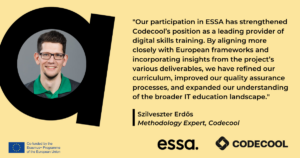Codecool’s Experience with the European Software Skills Alliance (ESSA): Insights and Benefits
Codecool has always been dedicated to delivering top-tier digital skills training and strengthening Europe’s tech talent pool. As a digital skilling hub, Codecool found its participation in ESSA—especially within Work Packages 2 (Needs Analysis & Software Strategy) and 3 (Curriculum, Certification, Qualification)—to be instrumental in enhancing its approach to IT education and aligning with industry needs.
Strengthening Curriculum through European Educational Frameworks
A key outcome of Codecool’s involvement with ESSA was a deeper integration with European educational frameworks, including the European Qualifications Framework (EQF), the European e-Competence Framework (e-CF), and the European Quality Assurance in Vocational Education and Training (EQAVET). Engaging with these frameworks enabled Codecool to align its curriculum with European standards, strengthen quality assurance processes, and adopt a more intentional approach to curriculum planning. For example, Codecool now applies learning outcomes more strategically and has begun incorporating European Credit Transfer System (ECTS) points into program design.
This evolution has not only enriched the structure of Codecool’s courses but also made it easier for students and graduates to translate their learning into the broader European labor market.
Collaboration and Shared Methodologies
Through ESSA, Codecool had an opportunity to collaborate with educational experts across Europe, gaining valuable insights into how IT education is approached in different countries.
One of the most impactful interactions I had was with Paul Aertsen, part of Skillsoft Global Knowledge, and a member of the ESSA Consortium, who guided me through creating educational profiles from job profiles and breaking down course learning outcomes into unit-level objectives. His perspective helped us sharpen our focus on ensuring our curriculum is both industry-relevant and methodologically sound, says Szilveszter Erdős, Methodology Expert, Codecool.
Learning from Pilot Programs and Addressing Challenges
The reports and presentations we received from the pilot programs offered concrete data on what works in IT education and what doesn’t. These insights confirmed challenges that we had been experiencing ourselves, particularly in terms of participant admissions. We learned that recruiting participants for IT courses requires strong marketing efforts and, often, governmental or grant support to make programs accessible to a wider audience. This validation has influenced how we approach outreach and partnerships, adds Szilveszter.
Leveraging the Needs Analysis
One of the most valuable contributions from ESSA was the comprehensive Needs Analysis, which helped Codecool refine its strategy by underscoring the importance of both soft skills—such as teamwork and communication—and technical skills critical for roles like developers, test specialists, and DevOps engineers. While Codecool had long prioritised these competencies, the Needs Analysis offered fresh insights into emerging trends and market demands, enabling the company to fine-tune its offerings to stay aligned with industry needs.
Conclusion
Our participation in ESSA has strengthened Codecool’s position as a leading provider of digital skills training. By aligning more closely with European frameworks and incorporating insights from the project’s various deliverables, we have refined our curriculum, improved our quality assurance processes, and expanded our understanding of the broader IT education landscape. We are grateful for the opportunities ESSA has provided and look forward to applying what we have learned as we continue to evolve, concludes Szilveszter.

